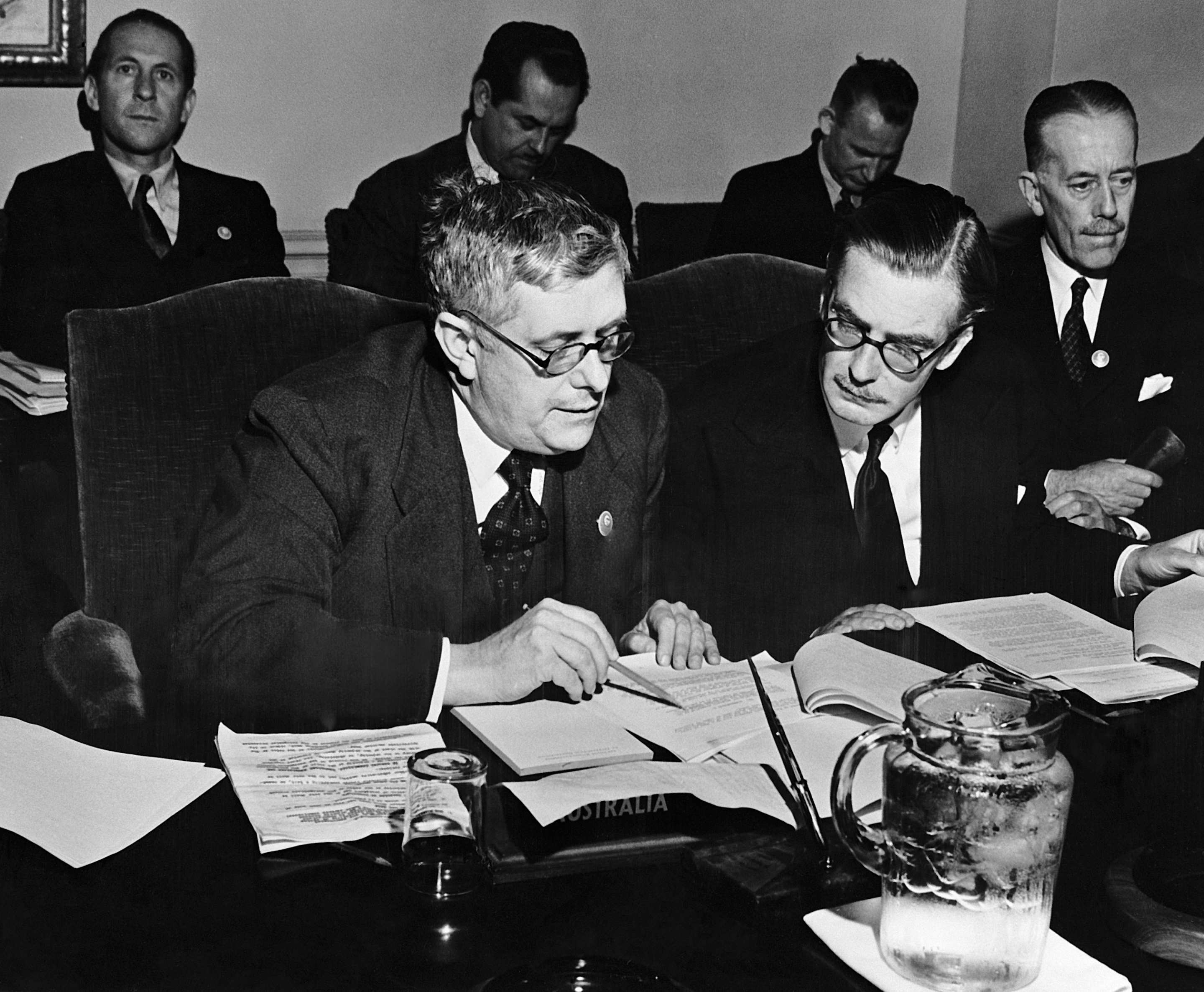Sydney's forgotten connection to the birth of the United Nations
A leading historian is calling for Sydneysiders to celebrate their connection to one of the world's greatest collective achievements: the founding of the United Nations.

University of Sydney alumnus Herbert Vere Evatt (left) in May 1945 discussing the text of the proposal with UK Foreign Secretary Anthony Eden. Photo: United Nations
As cities across the globe prepare to mark the 70th anniversary of the UN on 24 October, Professor of International History Glenda Sluga said a fresh consideration is needed of Sydney's pivotal role in the founding of the organisation through the pioneering work of two University of Sydney graduates.
"As we approach the 70th anniversary of the founding of the United Nations, it is worth reminding ourselves of Australia's history in international relations. And at the heart of that story are University of Sydney alumni: Herbert Vere Evatt and Jessie Street," said Professor Sluga.
Dr Herbert 'Doc' Evatt (BA 1915, MA 1917, LLB 1918) enjoyed remarkable success as a student at the University of Sydney, holding four degrees and winning three University Medals. The eminent scholar went on to a distinguished legal and political career, eventually becoming a high court judge, Attorney-General and Minister for External Affairs in John Curtin's Labor government in 1941.
As the head of Australia's delegation to the UN, Evatt rallied for the creation of a new international organisation in which all countries, including smaller nations like Australia, could have a voice in global negotiations.
"Doc Evatt was a key figure in the drafting of the UN Charter at the extraordinary 1945 San Francisco conference that determined the scope of the new intergovernmental organisation, including the voice it gave to 'smaller powers', and the attention it paid to the rights of colonial peoples," said Professor Sluga.
"Evatt also went on to become the president of the UN General Assembly that passed the landmark document, the UN Declaration of Human Rights."
Lesser known to history but equally instrumental to the birth of the UN was Jessie Street (BA 1910), a prominent women's rights advocate and social justice campaigner.
"Jessie Street was by Evatt's side as an 'informal' yet government appointed delegate," said Professor Sluga.
[Jessie] Street went against the conventions of the era to make her political mark as a voice for indigenous peoples and women's rights on the international stage.

University of Sydney alumna Jessie Street (right) at the United Women's Conference in San Francisco, 19 May 1945. Image: Sam Rosenberg
"She was a prominent presence in San Francisco, and sent the message of the new international order far and wide through her radio presentations transmitted back to an interested Australian audience."
Professor Sluga believes that modern considerations of Australia and the United Nations, such as in the recent successful bid to win a seat on the UN Security Council for 2013-14, often neglect a broader view of our nation's rich history with the organisation.
"For more than a century Australians have been deeply involved at popular and governmental level in international institutions and international politics, and in the conceptualisation of international law and human rights," she said.
"For all the UN's chequered history, if we ask ourselves what the world might look like without it, the answer is undoubtedly we would be much worse off. Remembering what our forebears thought the UN should aspire to might even help us make the world a far more equal and safer place than it is today."
Related articles
Humanities scholars elected into Australian academy
Three University of Sydney academics have been elected into Australia’s most prestigious humanities academy.

Maternity care for Aboriginal women
A new maternity services plan for Aboriginal and Torres Strait Islander women in rural and remote communities is urgently required, a report has found.
Between the South China Sea and human rights
Prime Minister Turnbull's decision to criticise China on the South China Sea issue, but avoid touching on the human rights issue, can be seen to be in the best interests of Australia, writes Klaus Raditio.
Sydney excels in national research engagement and impact assessment
Chinese investment in Australia falls by 36.3 percent in 2018
Strategic plan essential for increased Aboriginal participation
A landmark scheme to lift enrolment and completion rates of Aboriginal and Torres Strait Islander students has been hailed as crucial to achieve real progress in the sector.
How should Australia respond to a major cyberattack?
Student teams tackle cyberattack scenarios and security policy at the Cyber 9/12 Student Challenge - the first event of its kind in the region.
Explainer: what makes a good teacher
From judging what's best for the class and individual to finding the 'sweet spot' for learning, Dr Nicole Mockler explains teaching traits and skills.